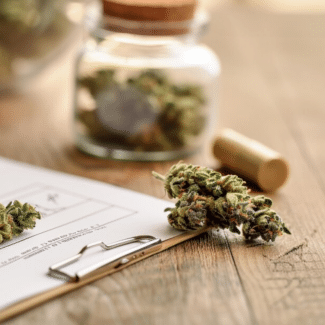How to Open a Cannabis Dispensary in New Jersey
This guide provides essential insights and practical steps for entrepreneurs looking to establish a cannabis dispensary in New Jersey. It covers the state’s regulatory landscape, the application process for various licenses, and the financial considerations involved in starting and operating a dispensary. Additionally, it highlights the importance of market research, the impact of social equity initiatives, and the evolving cannabis market in New Jersey.

While the illegal cannabis market is still operating throughout New Jersey, the legal cannabis industry has taken a step upward with the creation of New Jersey’s Cannabis Regulatory Commission.
Owing to the State’s commitment to the safe consumption of cannabis, New Jersey’s cannabis market looks quite promising and hopeful for aspiring entrepreneurs.
So, here’s a comprehensive guide regarding everything you must know before opening a cannabis dispensary in New Jersey.
Overview of Cannabis in New Jersey
New Jersey has witnessed a gradual change from strict restrictions against cannabis use to strict regulations on cannabis usage. Now that both medical and recreational use of cannabis is legalized, the cannabis market in New Jersey makes a lucrative target for entrepreneurs.
History of Cannabis Legalization in New Jersey
While New Jersey’s Cannabis Regulatory Commission may be new, the legalization of the medical use of cannabis dates back to 2010. New Jersey legalized medical marijuana with the Compassionate Use Medical Marijuana Act, allowing patients with qualifying medical conditions to obtain cannabis from state-licensed dispensaries.
Later in 2018, Governor Phil Murphy campaigned on a promise to legalize recreational cannabis. However, despite efforts by legislators to pass a legalization bill, this measure needed more support, leading to its withdrawal.
Finally, in 2020, the ballot initiative was set up. The cannabis lawyers, frustrated with the lack of progress in the legislature, became the frontmen in this ballot initiative to legalize recreational marijuana.
In November 2020, New Jersey voters approved the constitutional amendment, allowing adults aged 21 and older to use cannabis recreationally.
On August 19, 2021, the State came forward with the first official set of rules for cannabis dispensaries, including regulations for licensing, taxation, and social equity provisions, setting the stage for the development of a regulated market.
You can review the updated regulations from the New Jersey State League of Municipalities (NJLM) to ensure that you’re compliant.
Fast forward to April 21, 2022, the ‘historic day‘ when legal marijuana sales rolled out in New Jersey. Currently, the Cannabis Regulatory Commission is accepting applications for dispensaries throughout the State.
Current State of the Cannabis Market in New Jersey
Today, the cannabis market in New Jersey is experiencing rapid growth and development. The demand for cannabis and cannabis-related products has surged, creating opportunities for entrepreneurs to enter the industry and establish successful businesses.
The total number of dispensaries around the New Jersey State is medical-only, recreational-only, and medical-recreational dispensaries making a total of 45 facilities in various municipalities.
As the industry expands, regulations and licensing requirements evolve to ensure compliance, consumer safety, and fair competition. The State’s government is actively developing a robust regulatory framework, including licensing processes, product testing, taxation, and consumer protection.
As of 2023, the recreational cannabis reported gross receipts amounted to $144.86 million, and medical sales totalled $34.45 million in the first quarter. Since the majority of municipalities (almost 565) in New Jersey are still untapped, the market will witness more highs in upcoming years.
Social Equity Programs for Cannabis in New Jersey
Black and Brown people, as well as their neighborhoods, have been disproportionately impacted by the war on drugs. The negative effects of cannabis use are still noticeable even as its legalization spreads across the nation.
Even though Black and White persons consume marijuana at comparable rates, the ACLU reports that a Black person is 3.64 times more likely than a White person to be arrested for marijuana possession.
Due to this gap, social justice is a key component of both the New Jersey Cannabis Regulatory Commission’s application standards and the Cannabis Regulatory, Enforcement Assistance, and Marketplace Modernization Act (CREAMM Act).
Owners of Social Equity Businesses in New Jersey must have either resided in the State’s Economically Depressed Areas or have convictions for cannabis-related offenses, whether they were expunged or not. The application process for business licenses gives priority to candidates who support social equity.
This prioritization helps level the playing field for applicants who are interested in social fairness in a competitive economy where resources like real estate and capital are limited.
Types of Dispensary Licenses in New Jersey
In New Jersey, there are six types of licenses for recreational purposes established by the CREAMM Act. If you’re applying for social equity, ensure signing this attestation. The licenses for recreational cannabis business are as follows;
Class 1 Cannabis Cultivator
Authorizes cultivation of recreational cannabis. The fee structure is as follows;
- Microbusiness: $1000
- Standard Business (Tier I-TierVI): $5000-$50,000
Class 2 Cannabis Manufacturer
Authorizes manufacturing of recreational cannabis products. The fee structure is as follows;
- Microbusiness: $1000
- Standard Business: $20,000 (up to 10,000 sq. ft.), and $30,000 (for 10,000+ sq. ft.)
Class 3 Cannabis Wholesaler
Authorizes storing, selling, and transferring of recreational cannabis products between cannabis cultivators, wholesalers, or retailers. The fee structure is as follows;
- Microbusiness: $1000
- Standard Business: $10,000
Class 4 Cannabis Distributor
Authorizes transportation of cannabis items between cannabis cultivators, manufacturers, or retailers. The fee structure is as follows;
- Microbusiness: $1000
- Standard Business: $3000
Class 5 Cannabis Retailer
Authorizes purchasing of cannabis from licensed cultivators, manufacturers, or wholesalers and selling to consumers in a recreational retail store. The fee structure is as follows;
- Microbusiness: $1000
- Standard Business: $10,000
Class 6 Cannabis Delivery
Authorizes delivering a consumer’s recreational cannabis purchases from the retailer to that buyer. The fee structure is as follows;
- Microbusiness: $1000
- Standard Business: $3,000
Note: The Cannabis Regulatory Commission isn’t accepting applications for medical cannabis dispensaries or businesses as of yet. You can check for updates here.
Conditional Adult Use Retail Dispensaries (CAURD) License in New Jersey
As you must be aware, CAURD is a temporary license that gives applicants 120 days to find a site, secure municipal approval, and apply for conversion to an annual license.
A CAURD license in New Jersey authorizes you to begin building out operations for the cultivation, manufacture, dispensing, wholesale, distribution, or delivery of recreational use cannabis while working towards meeting the requirements for the required annual license.
Note: Every license has specific requirements regardings compliance or specialized cannabis insurance. So, it’s best to keep the requirements of your desired licenses in check.
Understanding the Cannabis Market in New Jersey
Starting a business in any industry and any State essentially requires thorough market research to understand the demand, competition, and consumer preferences. Making sense of the market dynamics helps potential entrepreneurs develop relevant strategies for success.
So, aim for factors such as consumer demographics, preferences, purchasing patterns, general trends, and stereotypes surrounding cannabis. If you want long-term success, it is crucial to know your target audience, assess local competition, and understand the regulatory landscape to ensure compliance and a competitive edge.
Application Process for a Dispensary License
Usually, the application process for cannabis dispensary licenses in New Jersey includes the following steps:
- Initial Preparation: Gather all the information and documents needed to prepare the application, including company strategies, financial records, security plans, and ownership details.
- Application submission: A well-written application contains all the relevant information and is accurate and thorough. A completed application will increase your chances of receiving the license and shorten the waiting period, so keep that in mind.
- Background checks: To guarantee compliance with state laws, candidates and important members of the dispensary’s staff will go through extensive background checks. This could include a fingerprint, proof of residency, proof of property ownership or owner consent, etc.
- Site Inspections: Since a business can only apply for one dispensary license or use CAURD licenses, New Jersey’s Cannabis Regulatory Commission inspects the site you choose before awarding a permanent license.
- Approval and Licensing: If the application meets all requirements and passes the necessary checks and inspections, the Cannabis Regulatory Commission of New Jersey then issues the dispensary license.
Here are a few useful resources from the State’s website that can help you craft the perfect application:
- Application Guide
- Application Platform Demo (Video)
- Step-by-Step Cannabis Business Navigator
- Webinars
- 10 Ways to Prepare to Submit Your Application
- MSA FSA Need to Know
Required Documentation for a License
If an application reaches the CRC’s office incomplete, they receive a Cure Letter that allows them to fix errors or complete their application. If you want to save time and effort, ensure that you already have all the documents you need.
Generally, the following documents are required for a cannabis dispensary license:
- Personal History Disclosure
- Entity Disclosure Forms
- Signed Affidavits, Releases, and Waivers
- Social Equity Business attestation
- Business Plan
- Financial Plan
- Security Plan
- Compliance Plan
- Other documentation, as required by the CRC
Note: Check out the CRC’s application acceptance for all information regarding eligibility, required documents, fees, and more.
Timelines for Obtaining a License
While the New Jersey cannabis authorities haven’t specified a time period for a cannabis dispensary license, it takes several months between initial application and final issuance of license on average.
The total time your applications take to process depends upon several factors, such as the completion of your application, the type of license you’re applying for, and more.
Typically, a conditional license application takes less time (3 to 6 months) than the annual license (6-12 months) applications. Your application may also take longer to process if there’s a backlog of applications.
Once you’re awarded the license, get your cannabis business registered with New Jersey’s Department of Revenue and Enterprise Services (DORES) within 15 days before starting operations.
Financing and Business Plan for a Dispensary
Starting a dispensary in New Jersey requires a solid business plan and adequate financing. If you’re looking for secure financing options, you must establish a solid business plan that aligns with the interests and policies of your investors.
Types of Financing Available
- Self-Funding
- Traditional Business Loans
- Private Investors
- Cannabis-Specific Lenders
Importance of a Solid Business Plan
It is no secret that your success and growth in New Jersey’s cannabis market heavily rely on your business plan. If your business plan has efficiently included your dispensary’s mission, vision, target market, advertising and marketing plans, and financial projections, it has everything that an investor would want to know before partnering with your firm.
A successful business plan demonstrates the viability, and potential profitability of the venture with regard to the local market, making it an additional reliable investment for lenders.
Risk Management Plan
Almost all financing options require you to establish a risk management plan that goes side by side with your business plan.
No business comes without risks, especially in a volatile industry like cannabis. Investors, lenders, equity firms, or any financing solution you choose need to ensure that their investment will be worthy. A risk management plan helps ensure that by maintaining security, preventing diversion, managing inventory, and complying with state and local laws.
When you’re at it, don’t forget to buy specialized cannabis insurance to cover any financial or reputational losses that may occur. Cannabis insurance makes businesses appear customer-centric and focused on long-term sustainable growth.
Market Research and Location for a Dispensary
New Jersey is a lucrative state, especially in terms of recreational cannabis, as proven by January-March 2023 sales. Still, you must consider several factors if you’re aiming for maximum profitability, such as population demographics, proximity to target customers, accessibility, and zoning regulations.
Location Requirements for a Dispensary
The New Jersey Cannabis Regulatory Commission (CRC) has established some zoning regulations to ensure that dispensaries are located in safe and accessible areas and that they do not pose a nuisance to neighboring businesses or residents.
Some of the location requirements for cannabis dispensaries in New Jersey include:
- Dispensaries must be located at least 1,000 feet from schools, playgrounds, and other sensitive locations.
- Dispensaries must be located within walking distance of public transportation.
- Dispensaries must be visible from public roads.
- Dispensaries must be located within a buffer zone of at least 500 feet from other dispensaries.
- Dispensaries must obtain approval from the municipality in which they are located.
Note: For more info regarding zoning laws, check the CRC page for any updates.
Insurance Requirements for a Dispensary in New Jersey
While the New Jersey Cannabis Regulatory Commission doesn’t require any specific insurance, it is still a good idea to cover your business against all potential liabilities and risks by obtaining adequate insurance coverage. Common types of insurance that dispensaries may require include:
- General liability insurance
- Product liability insurance
- Property insurance
- Workers’ compensation insurance
- Cyber liability insurance
- Directors and officers’ liability insurance
Costs of Opening and Running a Dispensary in New Jersey
Opening and running a dispensary in New Jersey incur various costs, including the following;
License and Permit Fees
When you apply for a cannabis license, you’re required to pay a specific license fee depending on your license type and the scope of your business.
However, almost all businesses require a business identification card issuance that costs $25. Plus, the background investigation costs must also be met by the businesses;
- Financial Source: $1,000
- Management Services Contractor: $1,000
- For each owner of a cannabis business or testing laboratory: $250 per person
Note: Conditional license applicants, conditional license-holders, and Social Equity Businesses are exempt from these fees.
Startup Costs:
Startup costs include costs of real estate, security systems, inventory costs, equipment costs, and up-front renovation costs.
The overall cost of starting a cannabis dispensary business could lie somewhere between $250,000 to $2,000,000.
Ongoing Costs:
Ongoing costs include rent/mortgage payments, salaries, inventory, utility bills, etcetera. Plus, marketing and advertising costs are also considered as ongoing costs.
On average, a typical cannabis dispensary pays almost $250,000 for annual staffing and $100,000 in yearly rent.
Taxes and Fees:
There’s a sales tax on recreational cannabis products of 6.625% and a 0% tax on medical cannabis sales. This tax is paid by customers at the POS. Plus, a cannabis cultivator charges a Social Equity Excise Fee (SEEF) for the sale or transfer of recreational cannabis. This fee is $1.52 per ounce as of 2023.
Resources for Potential Entrepreneurs in New Jersey
- New Jersey Cannabis Regulatory Commission (CRC)
- Marijuana Enforcement Tracking Reporting Compliance
- New Jersey League of Municipalities
- New Jersey CannaBusiness Association
Industry Experts in New Jersey
Engaging with these experts provides a wealth of information, helps navigate the complex regulatory landscape, and increases the chances of success in the New Jersey cannabis market.
FAQ about Opening a Dispensary
What Are the Qualifications for a Caurd License?
For a CAURD license, you must be able to submit a personal history disclosure form, entity disclosure form, signed affidavits, releases, waivers, and social equity business attestation (if applicable), along with other documents that you may require.
How Much Does It Cost to Open and Run a Dispensary?
The cost to open and run a dispensary can lie between $250,000 to $2 million. It depends on the size of your facility, license type, staffing requirements, infrastructure, and much more.
What Are the Location Requirements for a Dispensary?
New Jersey dispensaries should not be located within a municipality where cannabis activity (medical/recreational) is prohibited. Remember that the dispensary must be located at least 1000 feet from a school, church, hospital, etc.
What Types of Insurance Policies Are Required for a Dispensary?
The most common types of insurance policies every cannabis business must-have include general liability insurance, D&O insurance, product liability insurance, workers’ compensation insurance, etc.
Can I Apply for a Dispensary License if I Don’t Meet the Qualifications for a Caurd License?
Yes, you can apply for a medical-use dispensary license that allows you to sell marijuana products for medical use only if you don’t meet the qualifications of an adult-use license.
How Long Does It Take To Obtain a Dispensary License?
Typically, it takes around 3-6 months to obtain a conditional license. An annual license application can take around 6-12 months to process. However, the timelines can fluctuate due to various reasons.
What Are the Regulations for Advertising a Dispensary?
The CRC forbids cannabis businesses from targeting and depicting persons under legal age. The dispensary must prove that their ads are being viewed by at least 71.6% of people aged 21 or more. All ads must contain a warning indicating the inclusion of cannabis in a certain product. Check more regulations here.
Can I Have More Than One Dispensary Location?
Only microbusinesses limited to 2500 feet are allowed by the CRC to operate two dispensaries with one license. Other than that, you can only run a single dispensary on one cannabis license.
Final Thoughts
The cannabis industry surely offers promising and lucrative opportunities for aspiring cannabis entrepreneurs as of 2023. With the majority of municipalities still untapped, there’s an undeniable possibility that the $144.8 million (recreational) and $34.4 million (medical) sales marks will go up.
Still, businesses can only ensure the best results with a thorough understanding of New Jersey’s market and a sturdy risk management plan backed by adequate insurance.



